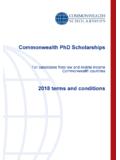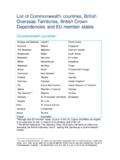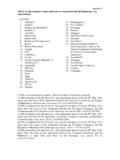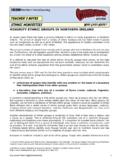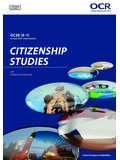Transcription of Commonwealth Distance Learning Scholarships
1 Commonwealth Distance Learning Scholarships 2018 terms and conditions INTRODUCTION. The Commonwealth Scholarship and Fellowship Plan (CSFP) is one of the largest and most prestigious international scholarship schemes in the world. Since it was established in 1959, 35,000 individuals have held a Commonwealth Scholarship or Fellowship 27,000 of them were funded by the UK government, through the Commonwealth Scholarship Commission in the United Kingdom (CSC). The CSC awards over 800 Scholarships and fellowships for postgraduate study and professional development to Commonwealth citizens each year. The CSC's Secretariat is provided by the Association of Commonwealth Universities, based in London; overseas services are provided by the British Council.
2 For information about the other Scholarships and fellowships offered by the CSC, visit For information about Commonwealth Scholarships offered by other Commonwealth countries , visit Commonwealth Distance Learning Scholarships . Commonwealth Distance Learning Scholarships are for candidates from least developed and lower middle income Commonwealth countries , for part-time Master's study by Distance Learning on selected courses offered by UK. universities. Funded by the UK Department for International Development (DFID), Commonwealth Distance Learning Scholarships enable talented and motivated individuals to gain the knowledge and skills required for sustainable development, and are aimed at those unable to study in the UK for financial and other reasons.
3 Purpose: To contribute to development needs of Commonwealth countries by providing training for skilled and qualified professionals in key development areas. Intended beneficiaries: High-quality postgraduate students who wish to access training not available in their home countries , who wish or need to remain in their home country while they study, and who have the potential to enhance the development of their home countries with the knowledge and leadership skills they acquire. Commonwealth Distance Learning Scholarships are offered under six themes: 1. Science and technology for development The scholarship, which may be in any area of science or technology (including, for example, agriculture, veterinary science, or forestry), will develop knowledge and/or skills that are directly related to the specific needs of a low or middle income country.
4 Where possible, applications should cite expressed national or local priorities. 2. Strengthening health systems and capacity The scholarship will develop knowledge and/or skills that will improve health provision or outcomes for disadvantaged groups in low and middle income countries . A range of approaches could be adopted, such as training staff to fill critical shortage areas; establishing better systems, processes, or management; health promotion and improving understanding of non-take up; or developing new treatments. 3. Promoting global prosperity The scholarship will support economic prosperity in low and middle income countries . The knowledge and/or skills gained could lead to, for example, enhanced trade capacity; improved economic understanding or decision -making by business or government; new products and services; or long-term capacity building, through the development of entrepreneurial skills, for instance.
5 4. Strengthening global peace, security and governance The scholarship will develop knowledge and/or skills that will strengthen peace and security at national, regional, or international levels. Multiple approaches could be used, such as strengthening open and transparent governance; improving mutual understanding within and between societies; or building systems that reduce the potential for conflict or encourage its resolution. 2. 5. Strengthening resilience and response to crises The scholarship will develop knowledge and/or skills which will help low and middle countries adapt to changing contexts, withstand sudden shocks, or increase capacity to preserve the continuity of operations following such events.
6 This could apply to a broad range of threats, including natural and physical disasters; long-term threats such as climate change; interruptions to the supply of key resources; or sudden economic or technological disruption. 6. Access, inclusion and opportunity The scholarship will develop knowledge and/or skills that will promote opportunity amongst historically disadvantaged groups in low and middle income countries . This could be through, for example, expanding educational opportunities; conducting community outreach; enhancing access to decision-making; or increasing understanding of the barriers faced. A range of disadvantage can be addressed including social, economic, gender, ethnic, regional, or political provided that the need is clearly stated.
7 ELIGIBILITY. To apply for these Scholarships , you must: Be a citizen of or have been granted refugee status by an eligible Commonwealth country, or be a British Protected Person Be permanently resident in an eligible Commonwealth country Hold a first degree of at least upper second class (2:1) standard; a lower qualification and sufficient relevant experience may be considered in certain cases Be unable to afford to study your chosen course without this scholarship. Your chosen university is responsible for ensuring that you meet the CSC's eligibility criteria. The CSC aims to identify talented individuals who have the potential to make change. We are committed to a policy of equal opportunity and non-discrimination, and encourage applications from a diverse range of candidates.
8 For further information on the support available to candidates with a disability, see the CSC disability support statement at ELIGIBLE Commonwealth countries . Bangladesh Papua New Guinea Cameroon Rwanda The Gambia Samoa Ghana Sierra Leone Guyana Solomon Islands India Sri Lanka Kenya Swaziland Kiribati Tanzania Lesotho Tuvalu Malawi Uganda Mozambique Vanuatu Nigeria Zambia Pakistan 3. HOW TO APPLY. You should apply to study one of the taught Master's courses offered under the Commonwealth Distance Learning Scholarship scheme. These Scholarships support courses offered in partnership with local providers in developing countries , as well as courses delivered directly by UK universities. For a full list of eligible courses, visit All applications must be made through your chosen university.
9 You must check with your chosen university for their specific advice, admission requirements, and rules for applying. You must take the necessary steps to secure admission to your course at the same time as applying for a Commonwealth Distance Learning Scholarship. When you submit your application, you must hold an offer to start your chosen course in the 2018- 2019 academic year. You must also provide the details of at least one referee in your application. You must make your application using the CSC's application system, in addition to any other application that you are required to complete by your chosen university. You can apply for more than one course and/or to more than one university, but you may only accept one offer of a Commonwealth Distance Learning Scholarship.
10 All applications must be submitted by (BST) on 20 June 2018 at the latest. The CSC will not accept any applications that are not submitted via the CSC's application system to your UK. university, or any applications directly from individuals; such applications will not be acknowledged. SELECTION PROCESS. Each participating UK university will conduct its own recruitment process to select a specified number of candidates to be awarded Commonwealth Distance Learning Scholarships . Universities must put forward their selected candidates to the CSC by 4 July 2018. Universities will inform candidates of their results in August 2018. Selection criteria include: Academic merit of the candidate Potential impact of the work on the development of the candidate's home country VALUE.
